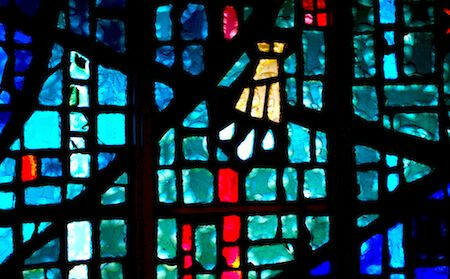Theology Matters: Virgin Birth

What do we mean when we say that Jesus was conceived by the power of the Holy Spirit and became incarnate from the Virgin Mary?
Sometimes Scripture leaves open and mysterious that which we would prefer were more buttoned-down and specific. Such is the case with the conception and incarnation of the Son of God. Such debate as there is on this deals with the “how” of it: how was Mary impregnated by the Holy Spirit? How did the biological act of conception occur? How can new life, which we know to be a combination of genetic material between a mother and father, come about when there seem to be 23 missing male chromosomes? Yet the gospels of Luke and Matthew, which tell the story of Jesus’ conception and birth (and do so in quite different and distinct ways), do not seem terribly interested in these matters, and are absolutely content to leave the biological questions unanswered. The ancient world, after all, didn’t know or understand the science of procreation as we do today. But rather than seeing this as a source of frustration, the lack of biological explanation of the how of Jesus’ conception can allow us to more properly stand in awe of the why. For if we’re able to move beyond the resolution of a question the answer of which is doomed to be inadequate and unsatisfactory (if we claim it was purely miraculous and God provided those missing chromosomes through purely divine action, some will dismiss the story as the unscientific nonsense of mythology; meanwhile, if we claim that Joseph provided those missing chromosomes, then others will resist a seeming diminishment of divine power and possibility), then we can actually get to the heart of what the story is really all about – that is, what we are really saying when we claim that Jesus “was conceived by the power of the Holy Spirit” and “became incarnate from the Virgin Mary.”
For when we make that statement, we are actually making two bold and profoundly important claims: we are saying that this child is fundamentally like, and also unlike, all other human beings. Like, in the sense that he was born from a human mother just like all of us. He didn’t “apparate” out of thin air like some magical or heavenly creature. He didn’t float down from the clouds, or materialize from an alternative world as a fully formed divine creature. He was born in the same way we all are. He grew inside his mother’s uterus and passed through all the same developmental stages each of us did until he was finally birthed into the world. Someone had to cut the umbilical cord that connected his little body to his mother’s, and he had to nurse like every other child of his day during his infancy. Our Savior was very much, in every way, a human being. This is important, because the gospel of Christ is not myth or fantasy. We are dealing with the real stuff of life, and God sent his Son into our messy, chaotic world in the very same way each of us enters it: as a naked, crying, vulnerable infant.
And yet, the Church teaches that Jesus was also distinct from every other creature, every other human being. He was the Son of God, and therefore, he was also divine. The gospels attempt to explain how this could be so by telling the story of his unique conception. Matthew points out that Mary became pregnant before she and Joseph, her betrothed, had ever had intercourse, and in Luke’s gospel, when Mary questions how this could be so, she is told that the “Holy Spirit will come upon you, and the power of the Most High will overshadow you; therefore the child to be born will be holy; he will be called Son of God.” Which is to say, Jesus was conceived by an act of God. God made this child through divine agency. He was truly and completely human, yet he was not like everyone else. Yes, he was a child of God in the way we’re all children of God, and yet he was uniquely, particularly the Son of God. And so it had to be, for without his two natures, his humanity and his divinity, he could not have been the Messiah, the Savior. His humanity draws all of us further into the divine life of God, and reveals the fullness of what we are all intended to be as human beings, and his divinity demonstrates that God is truly with us (“Emmanuel”), and it makes possible his perfect, sinless life.
So you see, what we mean when we talk about the conception of Jesus by the Holy Spirit is much more than a plain question of biology. It is at the heart of everything to do with God’s plan of salvation, and God’s intention to stop at nothing to rescue us and redeem us and be with us forever. God named all Creation good in the beginning of time, and God demonstrated the full capacity for goodness by choosing to be fully immersed in it, even to the point of entering the womb of a girl from Nazareth



